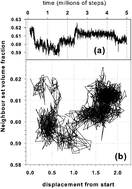We analyse the mesoscopic structure and structural fluctuations in simulated high-concentration hard sphere colloidal suspensions by means of calculations based on the void space. We show that remoteness, a quantity measuring the scale of spaces, is useful in studying crystallization, since ordering of the particles involves a change in the way empty space is distributed. Calculation of remoteness also allows breakdown of the system into mesoscopic neighbour sets. In the case of crystallizing systems, statistics of mean remoteness and local volume fraction in these neighbour sets are consistent with nuclei forming at locally higher concentration, i.e. nucleation involves increased heterogeneity of the system, as previously demonstrated in experiments with model colloidal particles. Meanwhile in dense amorphous systems, local volume fractions in neighbour sets reveal significant details of mesoscale structural fluctuations, indicating that abrupt dilations and compressions of local regions may be important physical components of cage fluctuations in the colloidal glass.

You have access to this article
 Please wait while we load your content...
Something went wrong. Try again?
Please wait while we load your content...
Something went wrong. Try again?


 Please wait while we load your content...
Please wait while we load your content...